
I went to Kampung Jemeri last weekend for the Water For Life CSR (Community Social Responsibility) program, which provides Orang Asli with access to uninterrupted water supply. Kampung Jemeri in Kuala Rompin, Pahang is about a 6 hour drive from KL and does not have one of the basic necessities of life – clean water.
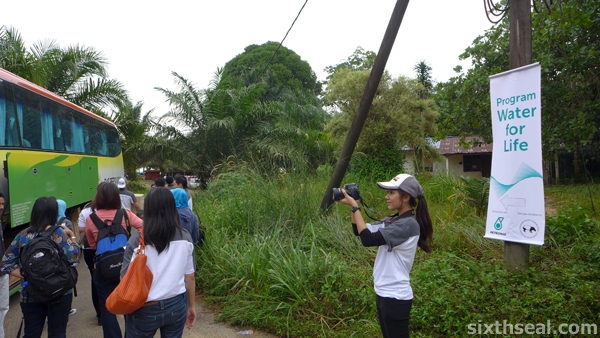
The entire Orang Asli village has to draw water from a very old pump and when it runs dry, they have to walk half a kilometer to draw water from the well and on days when the water supply was low, they had to make an incredible 5 km trek to reach the nearest river!

Water For Life is a venture of PETRONAS Dagangan Berhad (PDB) and Malaysian Nature Society (MNS) to ensure that the 131 families in Kampung Jemeri has a clean and safe water supply. The second phase involves 40 of us from PDB to help them install a rainwater harvesting system.
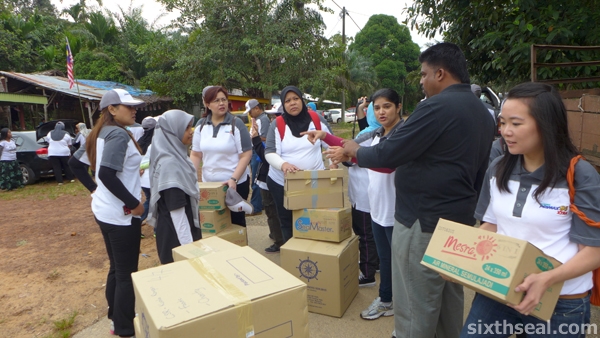
I’ve been to quite a few kampungs in my time but never to one where water is such a scarce resource! Long houses for Ibans in Sarawak is usually built close to rivers to that isn’t a problem. However, the Orang Asli here doesn’t even have a steady supply of that!
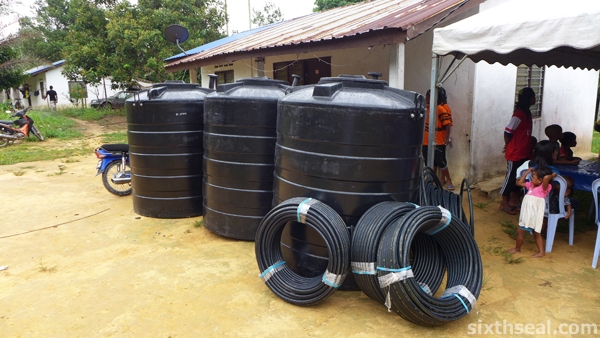
It was quite a pleasure to help them in this – we were all issued heavy duty gloves and a wristband to indicate which of the 4 large 400 liter water tanks we will be assigned to.

The large tanks are installed in sections throughout the main dirt road of the 131 Orang Asli families in Kampung Jemeri to provide easy access to water for all.
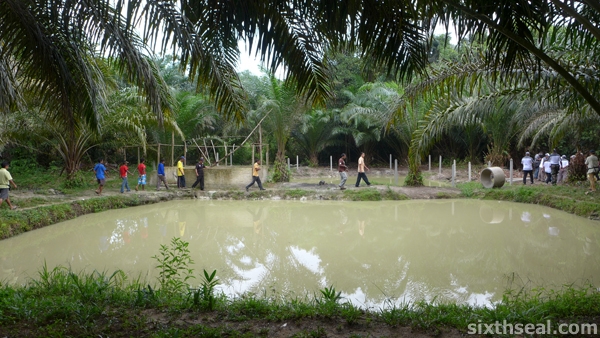
The first one was built at the start of the sprawling village and it takes in water from…

….two large rainwater harvesting ponds.
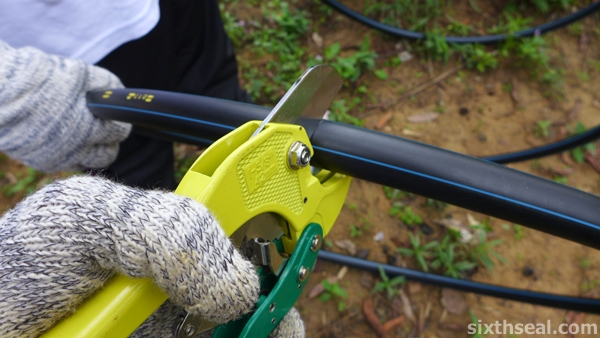
It is then sent up through a system of 100 meter pipes to the other tanks to allow everyone in the village easy access to water – right at their doorsteps.
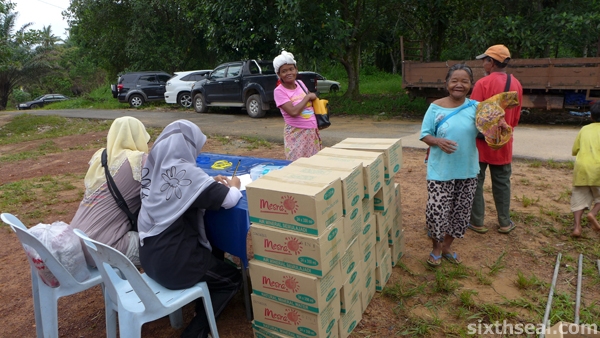
I was assigned to the very last water tank and we hefted it all the way to the rear of the village and did all the installation to accept the sequential water from Tank 1-3.

Blue Team!
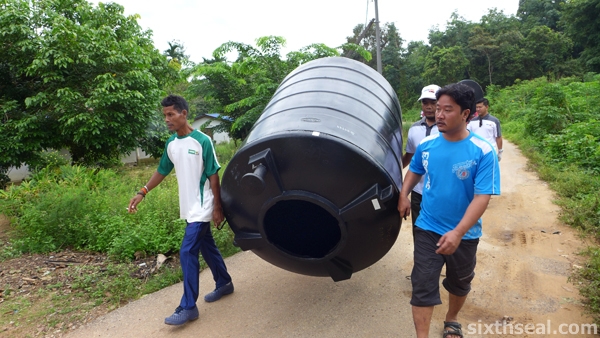
Hauling the water tanks into the village.

Since we’re at the last station, we had to first run the PVC pipe to the third water tank to hook up with them. I was surprised to find out that behind the dirt road is primary jungle!

I got quite a few mosquito bites from that but it’s all good fun.

We also had a toolbox which contains cutters and all the piping necessities to build the rainwater harvesting system. I assigned myself to hook up the piping to the tank itself…

…and also the last mile where I joined the PVC piping to a steed rod and a pipe with a lot of help.
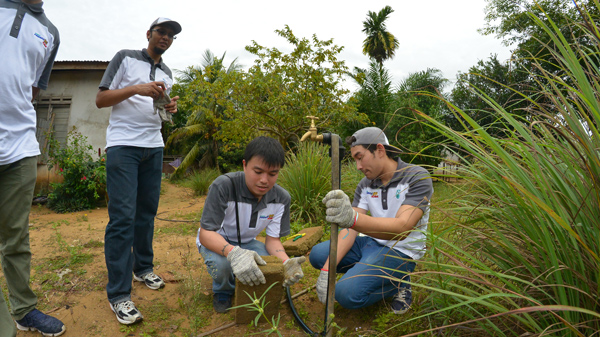
The box of tools has somehow been taken back to base camp, which is at least 500 meters away, and none of us wanted to make the trek back (which would tell you how far the villagers have to go for water every single time they wanted it – and get it back) so I used a huge stone to bang the steel pipe into the hard packed earth.
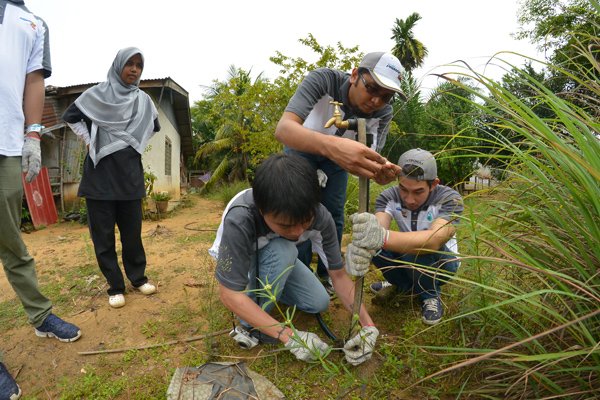
It worked even better than a hammer! The principle is much like that of piling in construction. I hefted the rock and let it go while another guy from PDB held it steady. In a minute or so, we managed to drive the entire steel rod in to hold the rest of the PVC and pipe!

Orang Asli hut! It’s barely 1 meter tall.

There’s actually people inside, preparing for lunch. They’re peeling bamboo shoots, which grows in the wild here.

Managing Director and CEO of Petronas DAGANGAN Berhad, Aminul Rashid Mohd Zamzam with Malaysian Nature Society and the village head of Kampung Jemeri in Kuala Rompin.
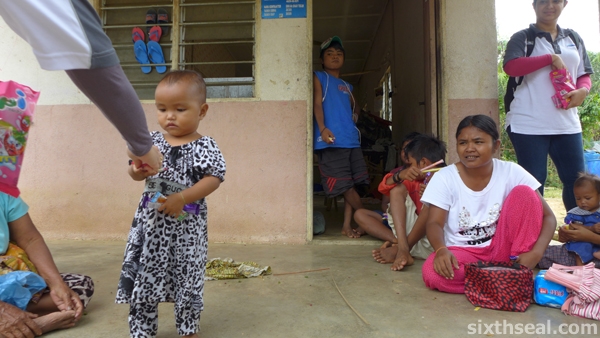
Handing candy out to the local kids.

The entire rainwater system with proper filtering was tested and water flowed smoothly…

…so all that was needed is to wait for the 4 tanks to fill up.

The Orang Asli villagers at Kampung Jemeri held a veritable feast for us, with local delicacies like ikan tenggiri masak tempoyak. There’s also a fiery sambal that Dina asked me to try and I immediately got hooked on. I ate a lot of that homemade sambal with ulam (raw vegetables).

However, the best part of the day was getting dirty and sweaty in helping these less fortunate folks get one of the basic necessities of life – water.

I’ve gotten a glimpse of how the Orang Asli in Kampung Jemeri lived and I’m glad I was part of the Water For Life initiative to help then get clean access to water.
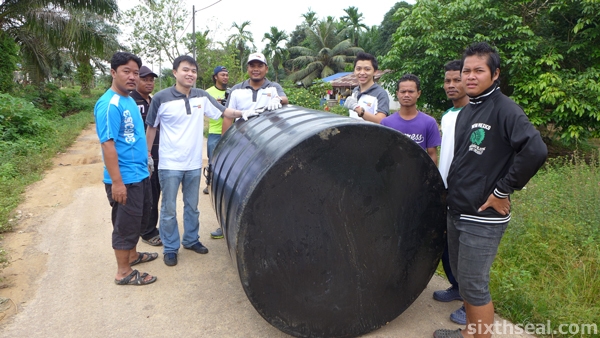
It’s a very good feeling, doing community work like this.
Great initiative by the company, a very good experience too. Well done HB 😀
Yeah, I thought that’s a nice CSR effort too! 🙂
I totally enjoyed the experience of going down there (it’s not very near) and helping install the fourth water tank and pipe. It’s fun to work physically for a change.
Thanks mate!
Ok, next stop…Selangau, Sarawak – all the people there have no water supply, low pressure, and some even have to travel to the bazaar to ask from the people at the shops there. Thankfully, there are nice decent folks there who understand their plight and allow them to take what they need. My daughter teaches in a primary school there – and we bring water from home every week.
Wow! It seems like Selangau would be a good place to do this as well! 🙂
I’ve heard of the water woes, to have to go to a bazaar to get water must be troublesome. These folks at Kampung Jemeri have to walk 5 km and I imagine the people without cars over in Selangau would have to walk as long to get water too.
I’ll suggest it next time I meet up with them for CSR work.
What a great CSR campaign! Good work and bringing back to community at its best! Seriously, love the work done!
Wilson
Yeah, I love doing these things too! 🙂
Giving back to the community is work that’s very fulfilling. I can see why some people choose to do this full time! Cheers!
Bravo! Good job!
Thanks Kathy! 🙂
Kudos to you for helping out and getting your hands dirty. However, my academic self can’t help asking a few questions:
1) Why are these Malaysian citizens not being provided clean water (and electricity, phone lines, internet?) by their government/local council?
2) Why were locals not paid to do the work (supervised by an appropriate professional), thus providing some surely welcome cash to people who do unskilled labour and are not able to find other work?
3) What resources/training/facilities are provided for the mainenance of the rainwater harvesting setup?
I’m not saying you should have to answer these questions, as you were not organising it, but they are relevant. So I felt like putting them here 🙂
Thanks Julian! 🙂
Hmm….good questions and I’ll try to answer the best I can based on my limited understanding (but don’t quote me on this since I’m effectively an outsider picking up what I’ve seen and heard, which may be wrong):
1. That’s a political question which is a very delicate question. My own opinion is that the constituency is very small. Perhaps too small to justify such an expensive undertaking.
2. I’m pretty sure they are. Malaysian Nature Society (MNS) uses local talent to help us e.g. the villages themselves. You can see them in the photos.
3. I don’t have the answers to this question but PETRONAS and MNS will do follow up visits, of that I know for sure.
Cheers mate!
What a touching post! I always believed you were God-Sent to make your GF happy but now you were sent to bring water to the poorest people too! It reminds me of those kampongs in Cambodia where I saw many wells being donated by foreigners esp Americans! Their wells contained clean & clear looking water that just needed simple filtering & boiling. I drank them before and survived!
Keep making others happy and your heart is radiating lights from this blog now!!! Muahahaha
Yeah, water is a very important thing! 🙂
A lot of people would make a lot of difference if they can provide clean drinking water. I just watched a documentary about the Ghurkas of Nepal and most of them don’t even have access to clean water! The British donates taps to Ghurkas who has served them in the past and they’re an important source of clean, drinking water.
I’m just glad to participate with this Kampung Jemeri initiative!
Meaningful activity!~
Yup! It was a lot of fun to help all those villagers get the water tanks and rainwater system installed! 🙂